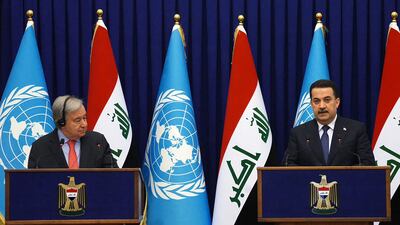UN Secretary General Antonio Guterres met Iraqi officials on Wednesday in Baghdad to discuss ways to support the nation with post-conflict recovery and to adapt to the effects of climate change.
His visit to Iraq comes as the country has endured months of political turmoil since a government was formed in October. Iraq, with a population of more than 40 million, is facing mounting economic, social and climate-change challenges.
Prime Minister Mohammed Shia Al Sudani said in a joint press statement: "The Iraqi government is highly appreciating this visit, which is a message of support to the Iraqi people and the state institutions, while facing hardships and challenges.
He said his country was "waiting for the UN support" to achieve his government's top-five priorities in creating jobs, developing public services, economic reforms and fighting poverty and corruption.
Mr Al Sudani highlighted Iraq's efforts to ease tension in the region, saying: "Iraq today is key to the solution in the region and no longer part of a political and security problem.
"We bring together the rivals and contrasting opinions in Iraq, which plays a vital role between the brothers and friends to achieve regional stability," he said, referring to talks between Saudi Arabia and Iran in Baghdad.
He also called for UN support in facing climate change and dwindling water in the two main rivers, the Tigris and Euphrates, a result of upstream dams in Turkey and Iran.
The country is ranked the fifth most vulnerable in the world to climate change, according to the UN Environment Programme. About one third of Iraq's population now live in poverty, while about 35 per cent of young people are unemployed, according to the UN.
"I am here in Baghdad with a measure of hope: hope that Iraq can break cycles of instability and fragility; hope that it can set a sustainable course towards greater prosperity, freedom, and peace," Mr Guterres said.
He said the numerous challenges Iraq is facing "did not arise overnight" but were products of "decades of oppression, war, terrorism, sectarianism and foreign interference".
"There is a real window of opportunity to achieve progress," he added, calling on the government to push ahead with reforms.
Mr Guterres landed in Baghdad late on Tuesday and was received by Iraqi Foreign Minister Fuad Hussein. His most recent visit to the country as UN chief was in the spring of 2017.
“This is a visit of solidarity,” the UN chief said in a briefing with Mr Hussein at Baghdad International Airport.
“A solidarity with the people and the democratic institutions of Iraq and a solidarity that means that the United Nations is totally committed to supporting the consolidation of the institutions in this country.”
He said he was confident that “Iraqis will be able to overcome the difficulties and challenges they still face through an open and inclusive dialogue”.
Mr Hussein described the visit as important, praising the relations and co-operation with the UN special mission to Iraq and UN.
“We always thank the Secretary General for his support to the political process and democracy in Iraq,” he said.
'Enormous' challenges
The meetings will focus on the “political developments in Iraq, the situation in the region and the world”, he added.
“There are enormous national, regional and global challenges and we need to exchange our point of view and the support of the secretary general to face these challenges, especially the national and regional ones,” he said.
As well as meeting Mr Al Sudani, Mr Guterres also met Iraqi President Abdul Latif Rashid. He was scheduled to meet representatives of women and youth groups.
On Thursday, he will visit a camp for displaced people in the north of the country, before going to Erbil, the capital of the Kurdistan region of Iraq.
During more than a year of political deadlock, Iraq teetered on the verge of collapse as political rivals quarrelled over forming the government.
The dispute not only affected the daily life of Iraqis, but led to clashes between Shiite militias in the Green Zone, the seat of the government, parliament, politicians' residences and foreign embassies.
In late October, Mr Al Sudani took office as the nominee of Iraq's biggest parliamentary group, the Co-ordination Framework, which is made up of Tehran-allied Shiite militias and political parties.


